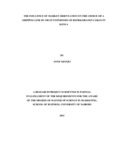| dc.description.abstract | The broad objectives of this study were to assess the influence of market orientation on the choice of a shipping line by fruit exporters of refrigerated cargo in Kenya. Three specific objectives were pursued, to establish the kind of activities that market oriented shipping firms engage in, to investigate the extent to which market orientation is practiced by shipping firms in Kenya, to identify market orientation activities that fruit exporters of refrigerated cargo value most amongst shipping firms. The population of the study comprised all fruit exporters of refrigerated cargo as listed on the Fresh Produce Association of Kenya Website. A descriptive cross-sectional survey was used. This study used both primary and secondary data. The primary data were obtained with the aid of a questionnaire, while the secondary data were obtained from renowned authors in the field of marketing. Data were analyzed using descriptive statistics. Degree of market orientation was assessed using Narver and Slater’s (1990) construct, adapted to the shipping industry. The major findings of the study are as follows: market orientation significantly influences fruit exporters of refrigerated cargo in Kenya on the choice of shipping line. Secondly, these three independent variables (customer orientation, competitor orientation, and inter functional coordination) greatly influence fruit exporters of refrigerated on choice of shipping line. Market orientation was depicted by more emphasis on inter functional co-ordination than both customer orientation and competitor orientation. The research was not without limitations. The descriptive cross sectional research design could not measure changes in organizational culture and performance over time, use of single key-informant approach, the study was limited to a single industry put constraints on generalizing of the results. Based on the limitations of the study, it was recommended that future studies should adopt longitudinal research design to assess changes in organizational culture and performance over time. Further, to capture representative view of organization, future studies need to use multiple informant approach. | en_US |

